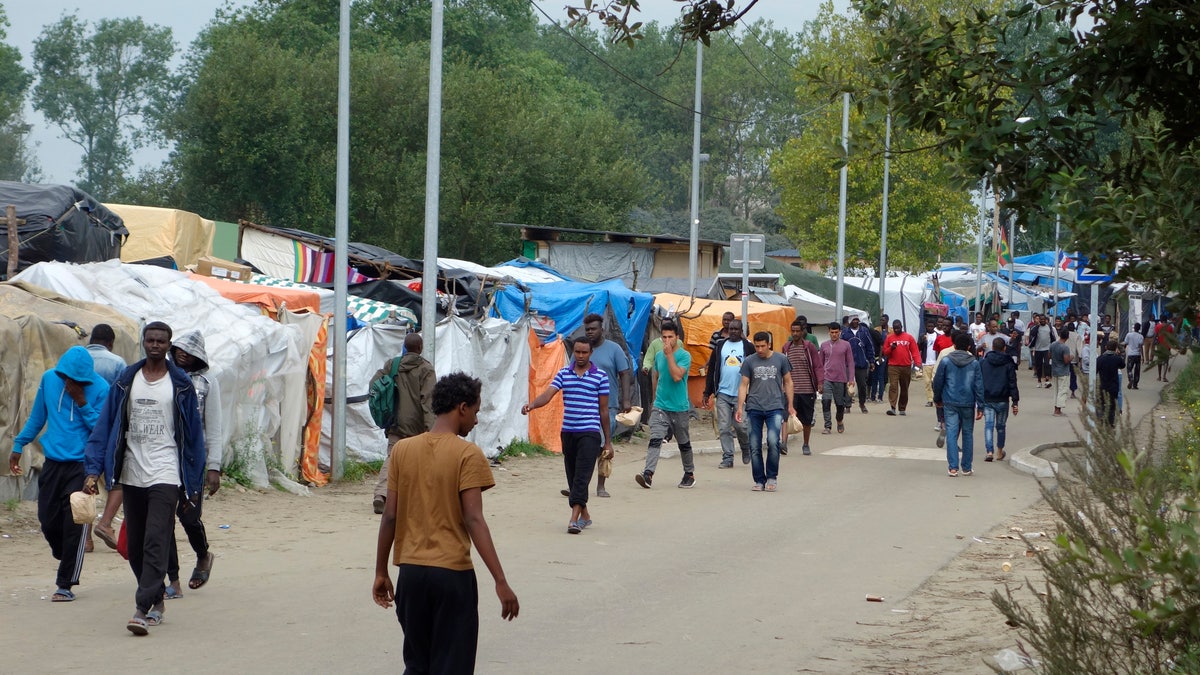
Sept. 6, 2016: Migrants walk in the northern area of the camp called the "Jungle" in Calais, France. (Reuters)
In what could be a "told you so" moment for Donald Trump, the U.K. on Tuesday announced plans to build a "big new wall" at a border port in France to prevent migrants in nearby camps from sneaking aboard vehicles heading to Britain.
Robert Goodwill, minister of state for immigration, announced the plan for a wall in Calais, France, at a Home Affairs Committee hearing Tuesday, saying it would be in addition to an already existing fence.
“We’re going to start building this big new wall very soon,” Goodwill said. “We’ve done the fence, now we’re doing a wall.”
The proposal is far smaller in scope than the kind of U.S.-Mexico wall Trump is demanding.
A Home Office spokeswoman told FoxNews.com the four-meter-high wall (about 13 feet) would be built along both sides of a one-kilometer (.6 mile) stretch of the main road into the Calais port. The office estimates it will be done by the end of the year.
Calais is a common point for migrants trying to enter the U.K. illegally. It is the narrowest point of the English Channel and has the most ferry crossings to England as well as being an access point to the Eurotunnel – the rail system that goes underneath the channel. The wall is intended to protect the road from migrants who frequently try to intercept vehicles approaching the port and jump on board.
Though the wall is significantly smaller than what Trump has proposed – and would protect a road rather than an entire border -- it weaves into Trump’s narrative that walls work and are a vital part of a comprehensive immigration policy.
Proponents of Trump’s plan have noted the success of other countries in building a border wall. The most commonly cited example is Israel, which built a wall along the West Bank that it says has been effective in reducing the threat of terrorism. Trump has cited Israel’s wall as justification for his own plan.
"You ask Israel whether or not a wall works," Trump told a New Hampshire crowd last year.
The migrant crisis in Calais has been a frequent issue of tension between the U.K. and France, with many in the U.K. concerned the French do not do enough to keep migrants from passing through.
In 2003, France, Belgium and the U.K. established “juxtaposed controls” – an arrangement by which British officials conduct immigration checks before passengers board the train or ferry from Calais, to prevent illegal immigrants from being able to lodge an asylum application on arrival in the U.K. Some French politicians have called for the arrangement to be undone.
The British government, meanwhile, has been pushing for stronger controls in Calais. A Home Office Committee report said the U.K. and France had invested in “additional fencing and floodlighting, CCTV, and infra-red detection technology.”
However, the report said the situation remained a “threat to UK security,” and noted the most common nationalities of migrants at Calais are Syrian, Eritrean, Sudanese, Iranian and Iraqi. It also found that between 5,000 and 7,000 migrants live in camps surrounding the area.
Bob Dane, executive director of the Federation for American Immigration Reform -- which advocates for stricter immigration controls -- welcomed the U.K. move but warned that more needs to be done.
“Border fences are not only visible, physical symbols that proclaim a country’s sovereignty and right to maintain a rule of law, but they also slow the flow of unauthorized entry. That said, Britain, just like the United States, must understand that unless the incentives for illegal entry are eliminated, border barriers will be breached,” Dane told FoxNews.com
Dane said Trump's immigration plan could offer guidance for Europe. “In his speech the other night, Trump moved beyond just building the fence and addressed the broader push-and-pull factors. Britain, and really all of Europe, will need to similarly take this holistic approach if it ever intends to mitigate the impact of mass migration,” he said.
The wall comes as new Conservative Prime Minister Theresa May sets her sights on cracking down on immigration in light of the British vote to leave the European Union in June. Goodwill told the committee the government wants to reduce immigration to “tens of thousands” of people “as soon as we possibly can.”
Trump's wall plan remains controversial. A CNN/ORC poll released Wednesday found only 41 percent of voters back a wall across the southern border.





















